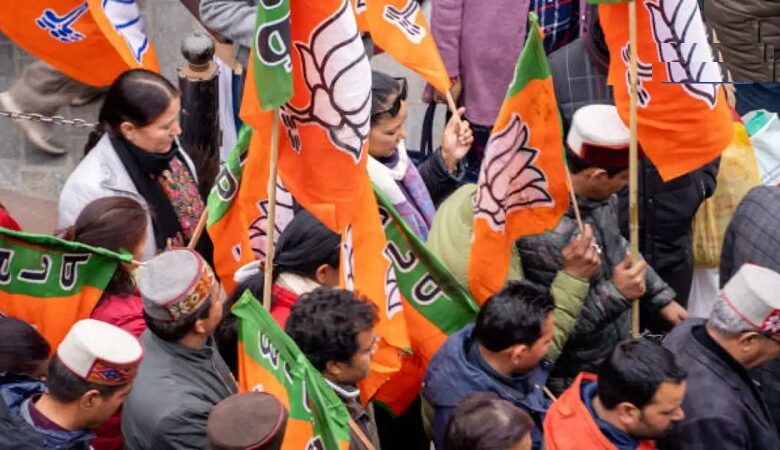BJP’s Third Electoral Triumph: A Testament to Democracy and Effective Governance
The election results, a testament to effective governance and strategic coalition-building, promise a future of continued progress and development for India.

Bornali Biswas -Editor in Chief / 6th June 2024
In a momentous election cycle, the Bharatiya Janata Party (BJP) and Prime Minister Narendra Modi have once again demonstrated their robust standing in Indian politics. Despite facing a reinvigorated opposition and complex electoral dynamics, the BJP, along with its National Democratic Alliance (NDA) partners, has emerged victorious. This achievement underscores not only the resilience and maturity of Indian democracy but also the effective governance and leadership of Prime Minister Modi.
Unwavering Trust in EVMs and Election Commission of India
First and foremost, the resounding victory of the BJP should prompt those who expressed doubts about the Electronic Voting Machines (EVMs) to offer an unconditional apology. The Election Commission of India (ECI) has once again delivered the people’s mandate with extraordinary effort and sacrifice, continuing its tradition as one of India’s best-performing institutions. This election cycle, marked by an extended seven-phase exercise, even witnessed the loss of lives, highlighting the immense dedication of the ECI.
The functionality of Indian democracy has once again been proven beyond doubt. The diverse electorate, representing a myriad of viewpoints, exercised their franchise maturely, resulting in a clear and desired mandate. The consolidated power of the opposition managed to slow down the BJP’s momentum, showcasing the dynamic nature of Indian electoral politics.
Strategic Electoral Battles
The electoral battlegrounds of Uttar Pradesh (UP), Maharashtra, and West Bengal presented significant challenges. In UP, the Samajwadi Party (SP) effectively collaborated with the Congress, successfully transferring votes and preventing a split in the Muslim vote. The BJP, despite its formidable campaign, miscalculated its support and missed a strategic tie-up with the Bahujan Samaj Party (BSP), a critical factor in Yogi Adityanath’s administration.
Maharashtra and West Bengal also proved to be tough terrains for the BJP, where local dynamics and strong regional parties held their ground. The Congress, despite facing setbacks, showed resilience and has been resurrected enough to remain a significant player for future contests.
Coalition Dynamics and Future Prospects
The BJP’s triumph, though not a majority on its own, showcases the importance of coalition politics. Prime Minister Modi, leading the NDA, will rely on allies, including Nitish Kumar’s Janata Dal United (JDU) and Chandrababu Naidu’s Telugu Desam Party (TDP), who have pledged their support. This coalition dynamic will influence governance and policy-making, highlighting the need for continued cooperation and strategic alliances.
The most notable success came from Bihar, where the inclusion of Nitish Kumar as a coalition partner yielded excellent results. Similar successes were observed in Odisha and Andhra Pradesh assembly elections. These outcomes reaffirm the significance of coalition politics and the necessity for the BJP to maintain harmonious relationships with its allies, such as the Shiromani Akali Dal, the original Shiv Sena, AIADMK, and BSP.
Economic Repercussions and Investor Confidence
The electoral results had immediate economic repercussions, with the BSE Sensex jumping 2,000 points and the NSE Nifty50 soaring above 22,500 levels. This recovery reflected restored investor confidence as the BJP-led NDA secured verbal promises of support from major allies, quelling fears of a hung parliament.
VK Vijayakumar, Chief Investment Strategist at Geojit Financial Services, highlighted that the market’s sharp correction moderated excessive valuations, facilitating institutional buying. He noted that stability would return as clarity emerged regarding the cabinet and key portfolios.
Prime Minister Modi’s Vision and Leadership
Prime Minister Modi’s leadership remains pivotal as he navigates the complexities of coalition governance. His vision for India, marked by critical reforms and economic growth, faces the challenge of a rejuvenated opposition. However, his commitment and enthusiasm are undiminished, promising a continued focus on development and progress.
The recent meeting of the Union cabinet, chaired by Prime Minister Modi, reflected the seriousness with which the BJP approaches governance. As the current Lok Sabha’s term ends, the BJP is poised to recommend its dissolution, paving the way for a new chapter in Indian politics.
The BJP, having secured 240 seats, along with the NDA’s clear majority in the 543-member house, stands ready to lead. The principal opposition party, Congress, securing 99 seats, remains a formidable force, ensuring a vibrant and dynamic political landscape.
A New Era of Indian Politics
The BJP’s electoral success and Prime Minister Modi’s leadership underscore the strength and resilience of Indian democracy. The election results, a testament to effective governance and strategic coalition-building, promise a future of continued progress and development for India. The BJP and its allies, while facing the challenges of coalition politics, are well-positioned to lead the nation to greater heights, reaffirming the trust and mandate of the Indian people.






